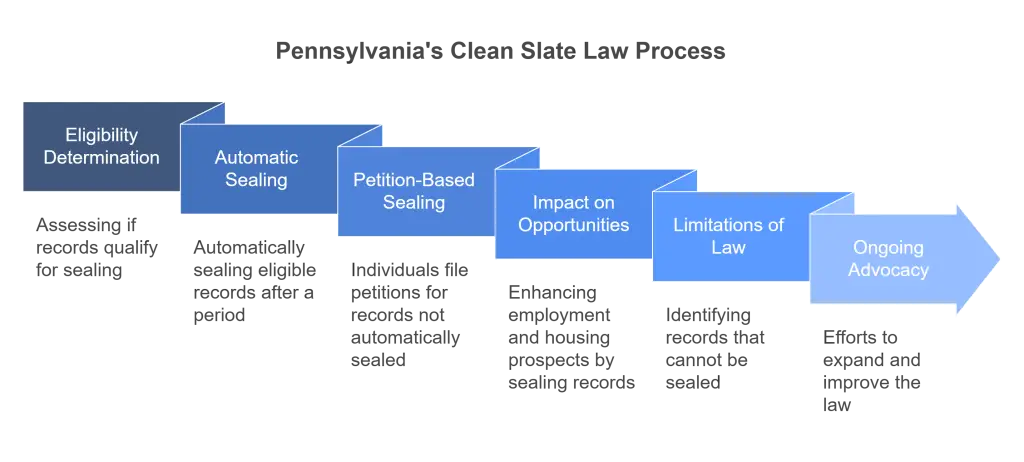Background checks are critical to the hiring process, tenant screening, and other settings in Pennsylvania. They help ensure the safety and integrity of workplaces, residential communities, and other settings. Pennsylvania has unique background check laws that differ from federal regulations, so it's important for residents and employers to understand these differences.
Key Takeaways
- Criminal History Record Information Act (CHRIA): This act governs the collection, maintenance, and dissemination of criminal history information in Pennsylvania, outlining what records employers can access and under what circumstances.
- Clean Slate Law: Pennsylvania's Clean Slate Law allows for the automatic sealing of certain criminal records after a specified period, preventing them from appearing in background checks and aiding individuals in gaining employment without the stigma of past offenses.
- Ban the Box Legislation: Philadelphia and other municipalities in Pennsylvania have implemented "Ban the Box" laws, prohibiting employers from inquiring about criminal histories on initial job applications to promote fair hiring practices.
- FCRA Compliance: Employers must adhere to the Fair Credit Reporting Act (FCRA) when conducting background checks, which includes obtaining written consent from candidates and providing them with a copy of the report if adverse action is taken based on its contents.
- Consideration of Offenses: Pennsylvania law requires employers to consider the nature of an offense, its relevance to the job, and the time elapsed since the conviction before making employment decisions, ensuring a balanced approach to hiring.
What Does a Pennsylvania Background Check for Employment Entail?
A Pennsylvania background check for employment typically involves verifying a candidate's criminal history, employment history, and sometimes education or professional licenses. Employers commonly use the Pennsylvania State Police Criminal History Record Information (CHRI) to access criminal records. However, it's crucial to understand that Pennsylvania law restricts the use of arrest records that did not result in a conviction. Employers must also be mindful of local "Ban the Box" ordinances, which limit when employers can inquire about criminal history during the hiring process. These checks are essential for employers to ensure workplace safety and make informed hiring decisions, but they must be conducted in compliance with state and local regulations to avoid legal pitfalls.
Furthermore, employers must adhere to federal laws like the Fair Credit Reporting Act (FCRA) when using third-party background check providers. This includes obtaining the candidate's written consent before conducting the check and providing them with a copy of the report if adverse action is taken based on the results. Understanding and navigating these legal complexities is paramount for Pennsylvania employers to maintain compliance and protect both their business and the rights of their applicants, as thoroughly explained in our guide to Pennsylvania background check laws.
One of the most notable aspects of Pennsylvania's background check laws is the Clean Slate Law, which aims to provide a second chance for individuals with certain criminal records. This article aims to provide a comprehensive guide to Pennsylvania's background check laws, focusing on the latest updates, including the expanded Clean Slate 3.0 law. Understanding these laws will help you effectively navigate the complexities of background checks in Pennsylvania.
EXPERT INSIGHT: "Everyone deserves a second chance" prominently declares The Clean Slate Initiative's (CSI) website. This principle resonates deeply in many religious teachings and values-based literature. While it may sound cliché, it holds profound and transformative truth. Individuals with criminal records often struggle to reintegrate into society as contributing members due to a lack of opportunities, perpetuating a cycle of marginalization. CSI addresses this critical issue, with Pennsylvania leading the way as the first state to enact laws aligning with CSI's criteria for Clean Slate legislation. Discover how this impacts background screening, whether you have a criminal record or know someone who does. It is crucial for business owners and HR practitioners in Pennsylvania and other states with Clean Slate legislation to understand its implications. - Emile Garcia, SHRM-SCP, CHRP, CHRBP
Types of Background Checks in Pennsylvania
Criminal Background Checks
Firstly, criminal background checks are essential for employers, landlords, and others to ensure the safety and security of their environment. The checks involve accessing state criminal records maintained by the Pennsylvania State Police, which provide a detailed history of an individual's criminal activity within the state. Additionally, nationwide criminal database searches can be conducted to identify any criminal history across the United States. County criminal searches are common, and records are checked at the county level where the individual has lived or worked. These comprehensive checks help make informed decisions about hiring, leasing, or other engagements with individuals.
Employment Background Checks
Employment background checks are crucial for verifying a candidate's qualifications and history. Employers often conduct these checks to confirm work history, ensuring the candidate has the experience they claim to have. Education verification is another key component, which involves confirming the accuracy of the educational credentials provided by the candidate. Reference checks are conducted to evaluate the candidate's performance and character based on feedback from previous employers and references. Employers use these checks to make informed hiring decisions and maintain a trustworthy workforce.
Credit Checks
Landlords and financial institutions frequently use credit checks to evaluate an individual's financial trustworthiness. These checks entail reviewing an individual's credit history, including their levels of debt, payment history, and any previous bankruptcies. Credit checks are typically conducted for positions that involve handling financial transactions or sensitive financial information. The use of credit checks helps in assessing the financial stability and responsibility of potential tenants, borrowers, or employees. It's important to note that employers must comply with the Fair Credit Reporting Act (FCRA) when conducting credit checks.
Driving Records
Driving record checks are crucial for positions that require driving, ensuring that candidates have a safe and reliable driving history. These checks typically include reviewing an individual's motor vehicle records (MVR), which provide details about driving violations, accidents, and license status. Employers use this information to assess the risk of hiring individuals for positions involving driving company vehicles or operating machinery. In addition to employers, insurance companies conduct driving record checks to determine the appropriate premiums for auto insurance policies. Ensuring a clean driving record can significantly impact employment opportunities and insurance rates.
Drug Testing
Lastly, drug testing is often a part of the pre-employment screening process to ensure a drug-free workplace. These tests can detect the presence of illegal substances and certain prescription drugs in an individual's system. Employers use drug testing to maintain safety, productivity, and compliance with federal and state regulations. Additionally, it is important to clearly communicate drug testing policies to candidates and employees while ensuring that the tests respect privacy and comply with legal standards. Regular drug testing can contribute to creating a safe and healthy work environment.
Pennsylvania's Criminal History Record Information Act (CHRIA) and Clean Slate Law
The Criminal History Record Information Act (CHRIA) governs the collection, maintenance, and dissemination of criminal history record information in Pennsylvania. This law impacts background checks by defining what types of criminal records are accessible to employers, landlords, and other entities. Under CHRIA, certain criminal records are protected and cannot be disclosed without proper authorization. Employers must comply with CHRIA regulations to avoid legal repercussions and ensure fair hiring practices. Understanding CHRIA is essential for both employers and individuals to navigate the complexities of criminal background checks in Pennsylvania.
Pennsylvania's Clean Slate Law
The Clean Slate Law is a groundbreaking initiative in Pennsylvania that gives individuals a second chance by sealing certain criminal records. This law allows for the sealing of specific criminal records, helping individuals with past convictions rebuild their lives. The Clean Slate Law has evolved through various phases, with Clean Slate 3.0 being the latest update. Starting in February 2024, more records may be sealed, and the process for clearing records will be simplified. Understanding the Clean Slate Law is crucial for individuals and employers alike.

Record Sealing Under Clean Slate
Automatic Sealing: The Clean Slate Law automatically seals certain criminal records without any action required from individuals. Summary offenses, like minor infractions, will be sealed after five years if no new offenses have been committed. Misdemeanors will be sealed after seven years, as long as there are no subsequent offenses. Non-violent felonies can be sealed after ten years without any new offenses.The Clean Slate 3.0 law, starting February 2024, will automatically seal less serious drug and property-related felonies after 10 years with no new offenses.
Petition-Based Sealing: Please keep in mind the following details. Petition-based sealing involves individuals filing a petition in court to have their records sealed. This process is used for certain offenses that do not qualify for automatic sealing. According to Clean Slate 3.0, individuals can petition to seal other property-related felonies after 10 years with no new offenses. The petition process requires submitting the necessary documentation and appearing in court if necessary. It is important for individuals seeking to clear their records to understand the steps and eligibility criteria for petition-based sealing.
Impact on Employment, Housing, and Other Opportunities
The Clean Slate Law significantly impacts employment and housing opportunities by removing barriers for individuals with sealed records. Sealed records are not accessible to most employers and landlords, which helps individuals with past convictions find jobs and housing without the stigma of a criminal record. This law promotes fair hiring and housing practices, enabling individuals to rebuild their lives and contribute positively to society. Employers and landlords must know the Clean Slate provisions to ensure compliance and avoid discriminatory practices.
Eligibility and the Process
Determining eligibility for record sealing under the Clean Slate Law involves understanding the types of offenses that qualify and the waiting periods required. For automatic sealing, individuals do not need to take any action if their records meet the eligibility criteria. For petition-based sealing, individuals must file a petition in court, which includes submitting necessary documentation and potentially attending a court hearing. Resources such as the My Clean Slate PA website guide check eligibility and initiate the sealing process. Legal assistance may also help navigate the complexities of the petition process.
Limitations of Clean Slate
The Clean Slate Law has certain limitations. Not all records are eligible for sealing, and violent crimes and sex crimes cannot be sealed. Even if records are sealed, law enforcement can still access them. Understanding these limitations is crucial for individuals seeking to benefit from the Clean Slate Law, as well as for employers and landlords. Understanding which records can and cannot be sealed is crucial for compliance with the law.
Ongoing Debate and Future of Clean Slate
The Clean Slate Law continues to evolve, with ongoing advocacy efforts to expand its provisions further. Potential future expansions may include reducing waiting periods for sealing records and including more types of offenses. Advocacy groups and legal organizations promote these changes and provide resources for individuals to benefit from the law. Staying informed about the ongoing debate and future developments is essential for understanding Pennsylvania's evolving background check laws.
Employer Responsibilities and Compliance
Employers in Pennsylvania must comply with state and federal background check laws for fair hiring and legal compliance. One key responsibility is obtaining informed consent from candidates before conducting background checks. Employers must comply with the Fair Credit Reporting Act (FCRA) for employment decisions. When making adverse employment decisions based on background check results, employers must follow specific procedures, including providing a pre-adverse action notice, a copy of the report, and a summary of rights under the FCRA. Additionally, employers must stay informed about the Clean Slate Law to ensure that sealed records don't influence their hiring choices. Staying informed and compliant with these regulations is essential for fair and lawful employment practices.
Individual Rights and Remedies
Pennsylvanians have the right to know what information is included in their background checks. This transparency helps individuals understand and verify the accuracy of their background check reports. If there are errors in the report, individuals have the right to dispute and correct them, ensuring that their background check information is accurate and up-to-date. Additionally, under the Clean Slate Law, individuals can petition to have eligible records sealed, allowing them to clear their records and improve their employment and housing prospects. Understanding these rights is crucial for protecting oneself during the background check process and taking advantage of the remedies available under the law.
Recent Updates and Trends in PA Background Check Laws
Recent updates to Pennsylvania's background check laws include enacting Clean Slate 3.0, which expands the scope of automatic and petition-based record sealing. Effective February 2024, this update contains less severe drug and property-related felonies for automatic sealing and allows for petition-based sealing of other property-related felonies. These changes reflect a broader trend toward reforming criminal justice policies and improving employment and housing opportunities for individuals with past convictions. Other trends include increased use of technology in background checks and increasing emphasis on compliance with privacy and anti-discrimination laws. Staying informed about these updates and trends is essential for individuals and employers to navigate Pennsylvania's evolving landscape of background check laws.
FAQ on Clean Slate and Background Checks in PA
What is the Clean Slate Law?
The Clean Slate Law allows for the automatic and petition-based sealing of certain criminal records in Pennsylvania, helping individuals with past convictions to move forward without the stigma of a criminal record. This law aims to provide a second chance for individuals by removing barriers to employment, housing, and other opportunities.
How does Clean Slate 3.0 differ from previous versions?
Clean Slate 3.0, effective February 2024, expands automatic sealing to include less severe drug and property-related felonies after 10 years with no new offenses. It also allows for petition-based sealing of other property-related felonies, making it easier for individuals to clear their records and improve their prospects.
Who is eligible for record sealing under Clean Slate?
Eligibility for record sealing under Clean Slate depends on the type of offense and the time elapsed since the conviction. Summary offenses, misdemeanors, and certain felonies can be sealed after specific periods with no new offenses. Understanding the eligibility criteria is essential for individuals seeking to benefit from the law.
How can I check if my record is eligible for sealing?
You can check eligibility through the My Clean Slate PA website, which provides resources and guidance on determining eligibility and initiating the sealing process. Consulting with a legal professional can also help navigate the complexities of the Clean Slate Law and ensure that your records are properly sealed.
Can employers access sealed records?
No, sealed records are not accessible to most employers. However, they remain accessible to law enforcement agencies. Employers must comply with the Clean Slate Law and ensure that sealed records are not considered in employment decisions, promoting fair hiring practices.
Conclusion
Understanding Pennsylvania's background check laws is essential for navigating employment, housing, and other opportunities. The Clean Slate Law, particularly with the latest updates in Clean Slate 3.0, is crucial in helping individuals with past convictions rebuild their lives. By staying informed and utilizing available resources, individuals and employers can ensure compliance with these laws and promote fair and just practices. For more information and legal assistance, consider visiting the My Clean Slate PA website or consulting with legal professionals specializing in Pennsylvania background check laws.
Additional Resources
- Do I Have to Disclose a Misdemeanor After 7 Years? Legal Insights
- How to Clear Your Background Check
- Non-Profit Background Checks: Best Practices for Organizations
- Overcoming Employment Barriers: A Guide for Job Seekers
- Will a DUI Affect a Background Check? Implications for Employment
- What Does an Employment Background Check Show?
- Arizona Background Check Laws: What Businesses Need to Know
- How Far Back Do Background Checks Go in Arizona?
- Understanding the Different Types of Background Checks
- How to Conduct Employee Background Checks for Small Businesses
- Pennsylvania Background Check Laws: Your Complete 2024 Guide
- Understanding Arizona Criminal History Records Information (ACHRI)
- Background Check Software Checklist: Customization & Integration
- How Long Does CBD Stay in Your System?
- Pennsylvania Construction Industry Background Checks: OSHA and Union Rules
- Pennsylvania Cannabis Employment Laws: Medical Marijuana and Background Checks
- Trucking Industry Background Checks in Pennsylvania: DOT Compliance
- Pennsylvania Healthcare Background Checks: Licensing for Nurses and Doctors
- Pittsburgh’s Salary History Ban: Implications for Employment Screening
- PA Act 235: Armed Security Guard Background Checks in Pennsylvania
- Pennsylvania Child Abuse Clearances: Who Needs Them and Why
- Philadelphia’s Fair Criminal Record Screening Standards: Local vs. State Laws
- Background Checks for Pennsylvania Teachers: PDE Requirements

GCheck Editorial Team
Meet the GCheck Editorial Team, your trusted source for insightful and up-to-date information in the world of employment background checks. Committed to delivering the latest trends, best practices, and industry insights, our team is dedicated to keeping you informed.
With a passion for ensuring accuracy, compliance, and efficiency in background screening, we are your go-to experts in the field. Stay tuned for our comprehensive articles, guides, and analysis, designed to empower businesses and individuals with the knowledge they need to make informed decisions.
At GCheck, we're here to guide you through the complexities of background checks, every step of the way.






